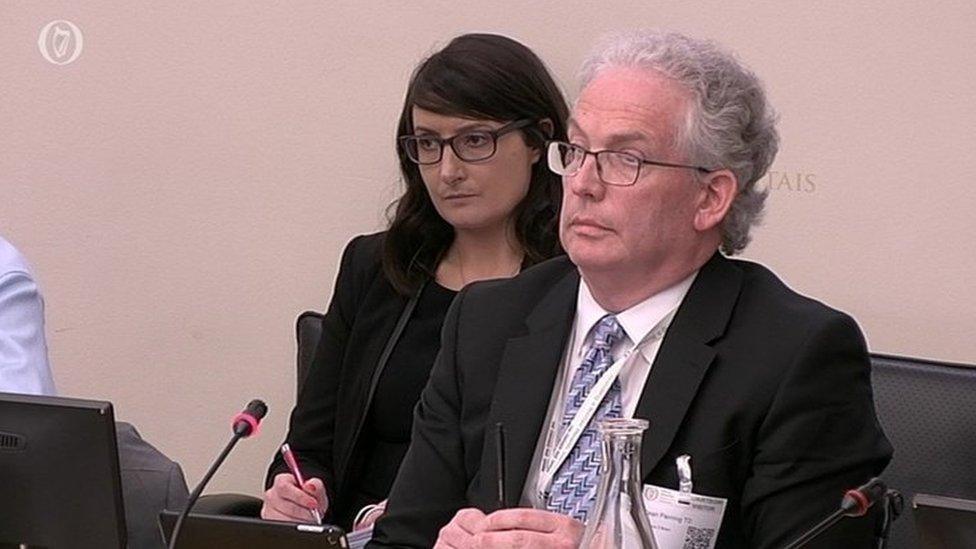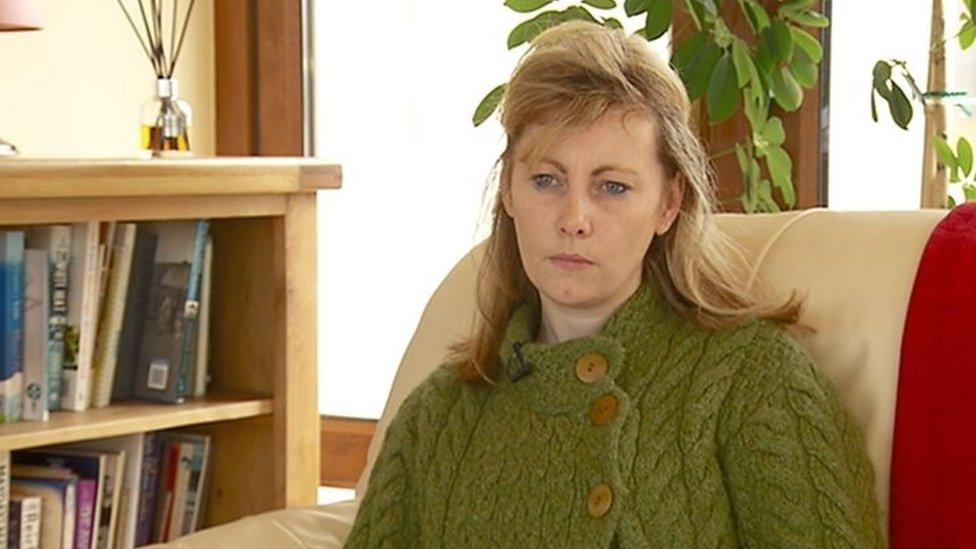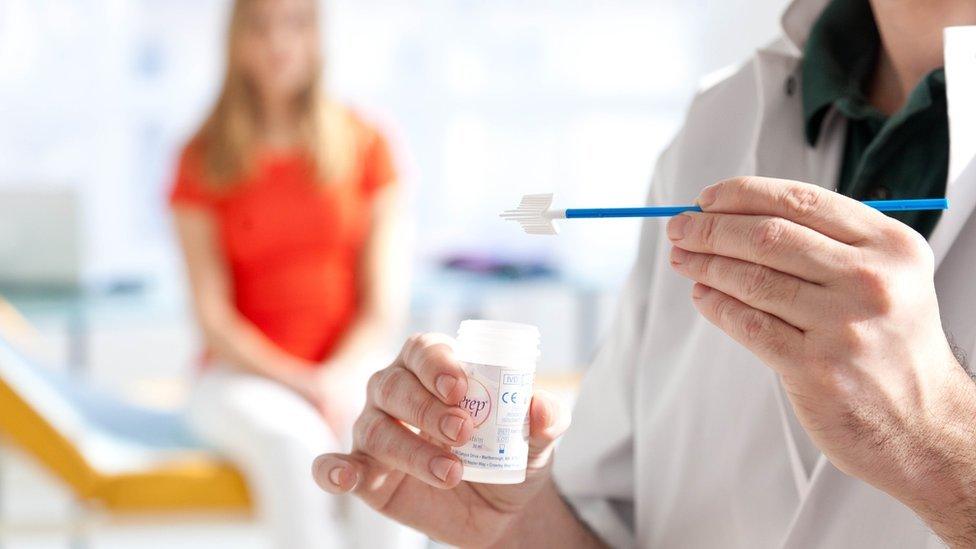Irish cervical check scandal: 'I'm dying when I don't need to'
- Published
Emma Mhic Mhathúna
A mother's story of having to explain to her children that she is going to die has reignited calls for the head of Ireland's health service to resign.
Emma Mhic Mhathúna has been given a terminal diagnosis of cancer.
She told RTÉ's Morning Ireland that her GP gave her the news this week.
Ireland's cervical smear services have been in the spotlight since it emerged that at least 208 women diagnosed with cancer should have received earlier intervention.
Mrs Mhic Mhathúna's interview came as a memo, released to the Public Accounts Committee earlier, showed that Health Service Executive (HSE) management were informed in July 2016 that plans were in place to tell medics treating individual women diagnosed with cervical cancer about the findings of a review of scans.
The July 2016 briefing note said that while the majority of cancers were detected as early as possible, not all cancers were prevented.
The mother-of-five told Irish national broadcaster RTÉ that as a mother it was her job to protect her children and keep the bad news away from them.
Mrs Mhic Mhathúna said she had been given a clear smear test in 2013 but was diagnosed with cervical cancer in 2016.
She has recently been told that the cancer has spread to her bones and is terminal.
Mrs Mhic Mhathúna said her gynaecologist told her that if her abnormal test had been picked up in 2013 she would not be in this position now.
"This is what makes it so heartbreaking. I'm dying when I don't need to die... this isn't fair," she said.
"My children are going to be without me and I'm going to be without them. I tried to do everything right and I don't even know if my little baby is going to remember me."
Mrs Mhic Mhathúna said her family had had "such a good day" celebrating her child's confirmation on Tuesday.
The interview has put further pressure on Tony O'Brien, the head of the HSE, the Irish health service, to resign.

Tony O'Brien, the head of Ireland's health service is resisting calls to resign over its handling of a cervical smear crisis
Mr O'Brien told the Irish parliament's Public Accounts Committee he had not been in a position to hear the interview.
When asked by the opposition Fianna Fáil TD (MP) Marc MacSharry whether his position was now untenable, Mr O'Brien said that question was based on the presumption that there was some action that has been taken that has led to this diagnosis, and that is far from established.
He said it was clearly always very tragic when any young person receives a diagnoses of terminal cancer.
He told Mr MacSharry the reason a screening programme existed was to limit the number of such cases, but it could not eliminate them.
Mr MacSharry said irrespective of the outcome, the recently announced scoping exercise into the CervicalCheck controversy showed there was a systemic failure and a national health crisis that is the worst in the history of the Irish state.
A search is being carried out to see if the July 2016 memos went to the Department of Health and to ministerial level.
The committee was told that Mr O'Brien saw all three versions of the memo.

Background to the CervicalCheck scandal
Detailed tests for Ireland's CervicalCheck, which has operated for the past 10 years, usually take place every three years.
However, because of a backlog they were outsourced to an American company which normally carries out less detailed tests but does so every year to compensate.
The American company, however, continued to test Irish samples every three years.
The lower detection rate in the US laboratory was brought to the attention of the Republic of Ireland's Health Service Executive (HSE) but appears not to have been acted upon.
At least 208 women diagnosed with cervical cancer should have received earlier intervention. 17 are now dead. At least 162 were not notified of the outcome of independent audits.
The Irish health minister, Simon Harris, said at the beginning of May that as many as 1,500 other cervical cancer tests had yet to be independently audited.

Mrs Mhic Mhathúna also criticised what she said was a lack of action by the Government.
"When it first broke out, I was like 'Okay, well, the head of the HSE is surely going to do something', and he didn't," she said.
"And then I looked to Simon Harris. I was thinking 'Well, surely the Minister for Health is going to step in and do something'. That's why we give these people powers, and he didn't do anything.

"So then I was like 'Surely the Taoiseach is going to do something'. And he just seems to be sticking up for them… they're all hiding there in the Dáil (Irish parliament) and they don't see what I see.
"The Government need to go. They're not actually - and I'm not being insulting, it's genuine - they're not actually capable of minding us, and that is their job. To make sure that we're okay."
Bad dream
Mrs Mhic Mhathúna said the only person who could do something now was the President and she never thought she would say that in a country in 2018.
"Last night I was in bed and I was having this really bad dream," she said.
"I dreamt that I was dying last night and I wasn't ready because I hadn't said goodbye to my children and in my dream I was trying to ring 999 but I couldn't pick up the phone.
"So in my dream I had gone in to Natasha, she sleeps across the landing, and I was trying to wake her up so that I could say goodbye to her because I hadn't said goodbye.
"And then I woke up and I was like 'Thank God I haven't died yet because I want to say goodbye to them.'"
- Published2 May 2018

- Published1 May 2018
